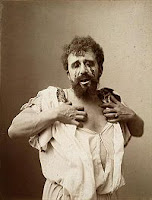Hamartia:
to miss the mark; tragic flaw
Oedipus, in Oedipus Rex, has one of the
greatest hamartias in literature, I think. To begin with, he walks with a limp
and it says it in his name; the word Oedipus literally translates to “swollen
foot” in Greek. But still, that’s not a downfall yet, some might call his limp
his mark for greatness, or better yet for tragedy, but not a downfall.
Some basic background information; King
Laius, Oedipus’s biological father, goes to the oracle and finds out that if he
gets a son for his first child, the son will end up killing him. Jocasta, the
wife of Laius, of course births a son. Not wanting to be killed by his own son,
he gives up the baby boy to a shepherd who names him Oedipus. The shepherd
gives the boy to the king and queen of Corinth. Soon enough, Oedipus finds out
he is adopted and goes to the same oracle who tells him he will kill his own
father but does not reveal his real parents. Oedipus, not wanting to kill who
he believes is his father, flees to Thebes. On his way, he encounters men on
the road and they argue, he kills the men and continues, not knowing he just
killed his biological father. He arrives at Thebes after solving Sphinx’s
riddle and marries a lady he met in the market, who turns out to be the former
queen and his biological mother. They have four children and he finds out that
he married his own mother and gouges his eyes out and flees. Jocasta kills
herself in humiliation.
 Through all of this though, we have to
remember Oedipus is a good hearted king, an honorable, honest, loyal and
generally good, man. With that said, he is far from perfect. Oedipus is hot-tempered, hasty in his judgment, proud of his intelligence, and
random in his decisions. As for temper, Oedipus’s character is infamous for his hot
tempered soul. The death of his father, the king, could have been completely avoided
if not for his anger problem. As for his judgment, he is quick to assume the
worst in people. For example, when the oracle kept refusing to reveal any more
information about his parents, and jumped to conclusions that people were
trying to kill him. He gets a sense of strong
pride after solving the Sphinx’s riddle which leads him into think he could
marry any woman in town, even one who is much older than he is like his own
mother.
Through all of this though, we have to
remember Oedipus is a good hearted king, an honorable, honest, loyal and
generally good, man. With that said, he is far from perfect. Oedipus is hot-tempered, hasty in his judgment, proud of his intelligence, and
random in his decisions. As for temper, Oedipus’s character is infamous for his hot
tempered soul. The death of his father, the king, could have been completely avoided
if not for his anger problem. As for his judgment, he is quick to assume the
worst in people. For example, when the oracle kept refusing to reveal any more
information about his parents, and jumped to conclusions that people were
trying to kill him. He gets a sense of strong
pride after solving the Sphinx’s riddle which leads him into think he could
marry any woman in town, even one who is much older than he is like his own
mother.
Oedipus’s hamartia is actually
quite clear, his downfall begins as soon as he leaves the oracle and travels to
Thebes. In efforts to avoid fulfilling the oracle’s visions, he does exactly that,
he fulfills it. It’s interesting to see the similarities between Oedipus and
Macbeth. Both go to a third party to hear of their fates; Macbeth with the
three witches, Oedipus with the oracle. Both try to change their fates; Macbeth
peruses his destiny, insuring that he becomes king; Oedipus tries to avoid the
oracle’s visions. Both end up in a tragedy; Macbeth dies and Oedipus blind. Yet
if they had both simply let their fates continued without any disturbance, then
both would have been prosperous. These characters’ need to control their fate
leads to their downfall.
